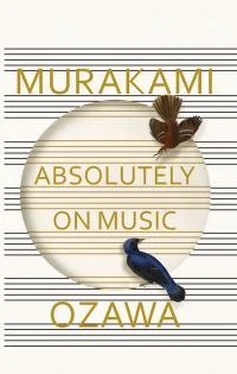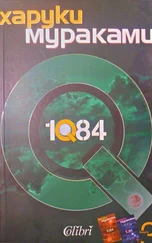At the same time, to see him mercilessly driving his body, which had yet to fully recover from several major operations, to see him literally grinding himself down as he grappled with the nurturing of these young musicians for virtually no compensation, made me feel that no matter how many bodies he might have to devote to this work, he would never have enough. I couldn’t stop myself from sighing, because it was, quite frankly, painful to see him like this. I found myself wishing I had the power to find him a spare body or two to keep him going.
Sixth Conversation
“There’s No Single Way to Teach.
You Make It Up as You Go Along.”
THIS INTERVIEW ORIGINALLY took place on July 4, 2011, aboard the express train heading from Geneva to Paris for the second concert presented by the Seiji Ozawa International Academy Switzerland. This one time, there were problems with the recording (thanks to my carelessness), and so supplementary interviews took place in Ozawa’s Paris apartment before and after the concert. Ozawa visibly showed his exhaustion in the two days between concerts. His expression retained some of the excitement from the success of the first concert, but the energy he had expended so unstintingly on stage had yet to return. His strength was reviving, but only little by little, as he urged himself on little by little, supplementing that with fleeting naps and furtive nourishment. In spite of all this, Ozawa came over to where I was sitting on the train and said, “Let’s talk!” When the subject turned to the education of young musicians, he spoke with far greater eloquence than when discussing his own music.
MURAKAMI: I had a chance to talk with Robert Mann yesterday between rehearsals, and he said that this year’s students are doing better than any in the years he’s been attending this event.
OZAWA: I think so, too. And why is that? Last year, as you know, I was too sick to attend, and that seems to have had a good effect, paradoxically. I really think so. I mean, here I am, supposedly the main promoter, and I’m always there, but the fact that I couldn’t be there probably made both the teachers and the students get serious about doing a really good job. Before, I was going around to all the sessions from morning to night, attending every rehearsal, observing them very closely. But last year I couldn’t come at all, and this year I just peeked in at a few of the sessions, leaving all the hard work to the teachers.
MURAKAMI: This year’s teachers are the same as last year’s, aren’t they?
OZAWA: Exactly the same. They’ve been the same from the start. But if you ask me, both Sadao Harada and Nobuko Imai have made huge strides as teachers over the years. Pamela Frank has always been good, but all of them are much better now in their teaching. Plus we’ve got such high-level students, a lot of them coming back year after year.
MURAKAMI: Which makes teaching them that much more worthwhile.
OZAWA: Exactly.
MURAKAMI: Are all the young performers who come here actually students?
OZAWA: Most of them are, but not all. We’ve got a few who are already active on stage as professional musicians. We had a rule at first that nobody could attend for more than three years, but after a while we let that go, and now there are no limitations. As long as you can pass the audition, you can come as many years as you like. So now the number of repeats has gone up, and so has the overall quality of the group. We’ve still got an age limitation, but I’m thinking of doing away with that, too, next year. So then you’ll be able to come back when you want, no matter how old you get.
MURAKAMI: At this point, the oldest musician is twenty-eight, and the youngest is nineteen, with most of the students in their early twenties.
OZAWA: Right. I’m thinking of changing that so people can keep coming into their thirties or forties. They just have to pass the audition. We also have a few special honor students who don’t have to audition—the violinists Alena and Sasha and Agata. They can attend any time they’d like, without preconditions. We’ll probably have one more of those next year.
MURAKAMI: So there’s a solid nucleus forming. But isn’t there some set maximum number of students you can take?
OZAWA: Well, actually, six string quartets—twenty-four students—should be the limit, but the way things worked out this year, we ended up with seven quartets. You really can’t put more than six quartets on stage in a concert setting, though, so we added the Mendelssohn Octet to this year’s program, combining the teachers and the four extra students so they could perform, too. Also, if I wasn’t able to attend again this year, we were going to drop the orchestra performance and do the Mendelssohn instead. But here I am, I made it, and so did Robert Mann, who was saying he probably couldn’t.
MURAKAMI: As a result of which, you ended up with a musically rich program—a very interesting concert the way it was put together. I was speaking with Mrs. Mann, who told me that her husband really enjoys teaching.
OZAWA: Yes, it’s true. And he and I are a good match, personality-wise. To tell you the truth, he is constantly being invited by all these famous places—Vienna, Berlin—but he turns them down so he can work with me—here in Rolle, and in Matsumoto, too. People tell me all the time that they envy me for being able to get him to come.
MURAKAMI: At ninety-two, though, he’s really getting on in years. To be blunt, there’s no way to know how long he’s going to be able to keep coming to these events. Won’t his absence create a huge gap to fill? I mean, his presence is obviously a major factor in this academy.
OZAWA: Yes, we’ve talked about that, and we’ve decided not to even try to replace him but to go on with just the current teachers—Pamela and Sadao and Nobuko. Finally, there isn’t anybody who could take his place. We’ve thought about it a lot, but can’t come up with anybody among living performers who could fill his shoes. Which reminds me—the only reason that he has taken to conducting orchestras lately is because I pushed him to do it. He refused at first, insisted he didn’t know how, but I nagged him to try, and he finally did it for the first time, in Japan. He seems to conduct with a lot more confidence these days.
MURAKAMI: Is he still playing the violin?
OZAWA: Very little, hardly at all. But he is going to play for us in Matsumoto—a Bartók quartet with Sadao Harada and the others. He won’t be conducting, just performing in the quartet. He was originally supposed to play in the Mendelssohn Octet here, but he ended up just conducting. He found it too demanding to do both, so he chose to conduct. Which was great for me.
MURAKAMI: I’m sorry he didn’t play in the Mendelssohn, though. I would have loved to hear him perform. I’ve been a fan of the Juilliard String Quartet since my teens. Observing the students here, though, maybe it’s because they come from all different parts of the world, but each one seems to have developed a distinctive character in his or her music.
OZAWA: That’s very true. Which makes it all the more worthwhile and interesting for us to be teaching them.
MURAKAMI: Especially in string quartets, you’ve got very individualized voices interacting with one another, so it can be thrilling when each voice has its own clear-cut character. Of course, that can work well in some cases and quite the opposite in others.
OZAWA: That’s true.
MURAKAMI: Now, turning to the orchestra, you conducted the Mozart Divertimento K. 136 and, for the encore, the first movement of Tchaikovsky’s Serenade for Strings. I assume the selection is different every year.
OZAWA: Yes, every year we play different pieces. Let’s see … what have we done in the past? I remember playing the complete Serenade for Strings, but that’s a bit too long. We also did Grieg’s Holberg Suite. And Bartók’s Divertimento for String Orchestra. I’ve conducted for six years here, always something different. I’d like to do Schoenberg’s Verklärte Nacht sometime, but that’s pretty long, too. It would have been too much this year, unfortunately.
Читать дальше











